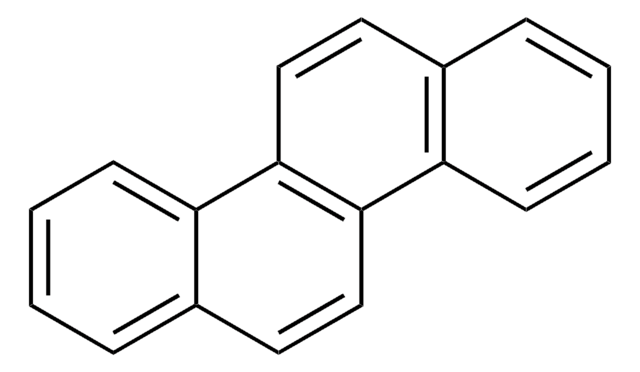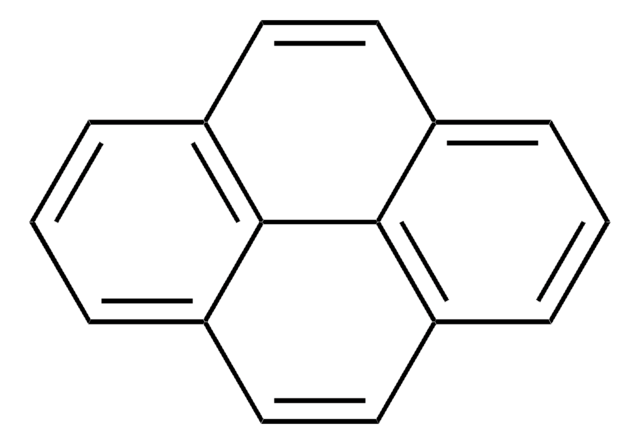91861
Dibenz[a,h]anthracene
certified reference material, TraceCERT®, Manufactured by: Sigma-Aldrich Production GmbH, Switzerland
Synonym(s):
1,2:5,6-Dibenzanthracene
About This Item
Recommended Products
grade
certified reference material
TraceCERT®
Quality Level
product line
TraceCERT®
shelf life
limited shelf life, expiry date on the label
manufacturer/tradename
Manufactured by: Sigma-Aldrich Production GmbH, Switzerland
technique(s)
HPLC: suitable
gas chromatography (GC): suitable
bp
524 °C (lit.)
mp
262-265 °C (lit.)
application(s)
cleaning products
cosmetics
environmental
food and beverages
personal care
format
neat
SMILES string
c1ccc2c(c1)ccc3cc4c(ccc5ccccc45)cc23
InChI
1S/C22H14/c1-3-7-19-15(5-1)9-11-17-14-22-18(13-21(17)19)12-10-16-6-2-4-8-20(16)22/h1-14H
InChI key
LHRCREOYAASXPZ-UHFFFAOYSA-N
Looking for similar products? Visit Product Comparison Guide
General description
Certified content by quantitative NMR incl. uncertainty and expiry date are given on the certificate.
Download your certificate at: http://www.sigma-aldrich.com.
Application
Packaging
Other Notes
The collision cross section (CCS) measurement was provided by Waters Corporation, using the SYNAPT XS mass spectrometer.
For a description and overview of how ion mobility enables the measurement of the CCS of an ion visit ims.waters.com.
Further information on the SYNAPT XS mass spectrometer can be found on the IMS microsite and product webpage.
TWCCS measurements are expected to be within 2% of this reference value.
P/N 91861 is part of the Waters Extractables & Leachables UNIFI scientific library which can be downloaded from Waters Marketplace.
Recommended products
Legal Information
signalword
Danger
hcodes
Hazard Classifications
Aquatic Acute 1 - Aquatic Chronic 1 - Carc. 1B
Storage Class
6.1C - Combustible, acute toxic Cat.3 / toxic compounds or compounds which causing chronic effects
wgk_germany
WGK 3
flash_point_f
Not applicable
flash_point_c
Not applicable
Choose from one of the most recent versions:
Already Own This Product?
Find documentation for the products that you have recently purchased in the Document Library.
Customers Also Viewed
Articles
This application note describes the fast and efficient separation of 16 + 2 standard polynuclear aromatic hydrocarbons (PAHs) compounds on an Ascentis® Express PAH column using EPA method 610 and EPA 8310 + 2.
Protocols
GC Analysis of Polynuclear Aromatic Hydrocarbons (PAHs) in Salmon on SPB®-608 (20 m x 0.18 mm I.D., 0.18 µm) after QuEChERS Cleanup using Supel™ QuE Z-Sep, Fast GC Analysis
GC Analysis of Polynuclear Aromatic Hydrocarbons (PAHs) in Salmon on SPB®-608 (20 m x 0.18 mm I.D., 0.18 µm) after QuEChERS Cleanup using Supel™ QuE Z-Sep, Fast GC Analysis
Our team of scientists has experience in all areas of research including Life Science, Material Science, Chemical Synthesis, Chromatography, Analytical and many others.
Contact Technical Service![Indeno[1,2,3-cd]pyrene analytical standard](/deepweb/assets/sigmaaldrich/product/structures/231/153/b0b230c2-efa0-4f43-a261-66b931ead3d2/640/b0b230c2-efa0-4f43-a261-66b931ead3d2.png)
![Benz[a]anthracene analytical standard](/deepweb/assets/sigmaaldrich/product/structures/351/486/b3ddf157-a732-4ef8-83f0-c70a53404cb2/640/b3ddf157-a732-4ef8-83f0-c70a53404cb2.png)

![Benzo[a]pyrene ≥96% (HPLC)](/deepweb/assets/sigmaaldrich/product/structures/253/820/be96d879-1811-46c0-8f11-612019691c2d/640/be96d879-1811-46c0-8f11-612019691c2d.png)
![Benzo[b]fluoranthene 98%](/deepweb/assets/sigmaaldrich/product/structures/175/744/6fa5fca2-b6ec-47b6-ab7a-fe895843f226/640/6fa5fca2-b6ec-47b6-ab7a-fe895843f226.png)
![Benzo[ghi]perylene 98%](/deepweb/assets/sigmaaldrich/product/structures/154/740/c50ff1be-dfb4-4159-a98c-9cecf9206ad3/640/c50ff1be-dfb4-4159-a98c-9cecf9206ad3.png)



